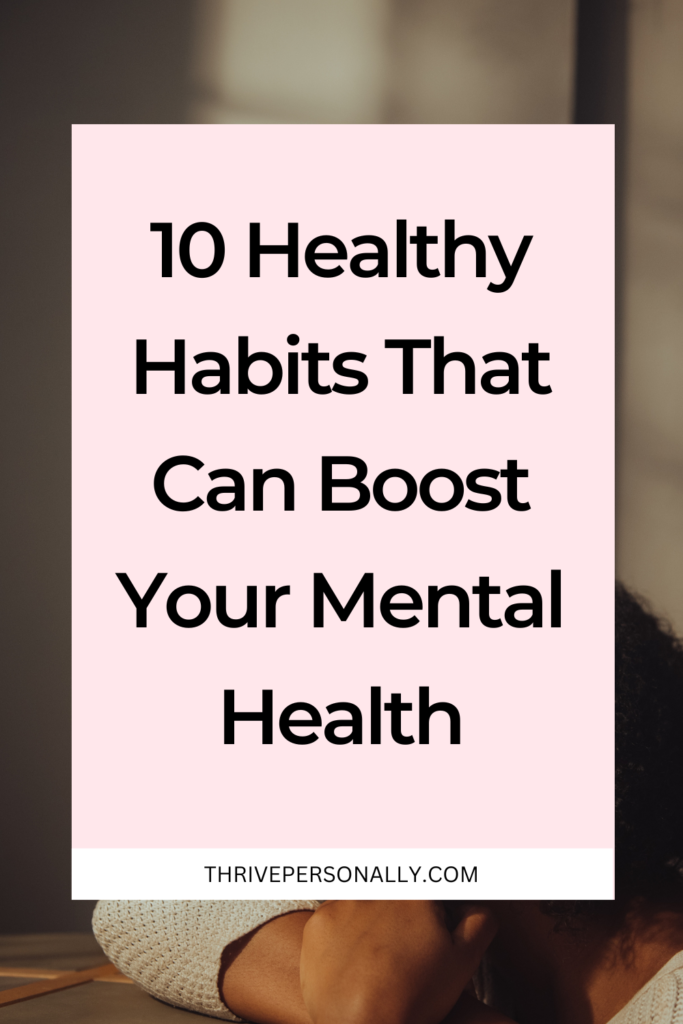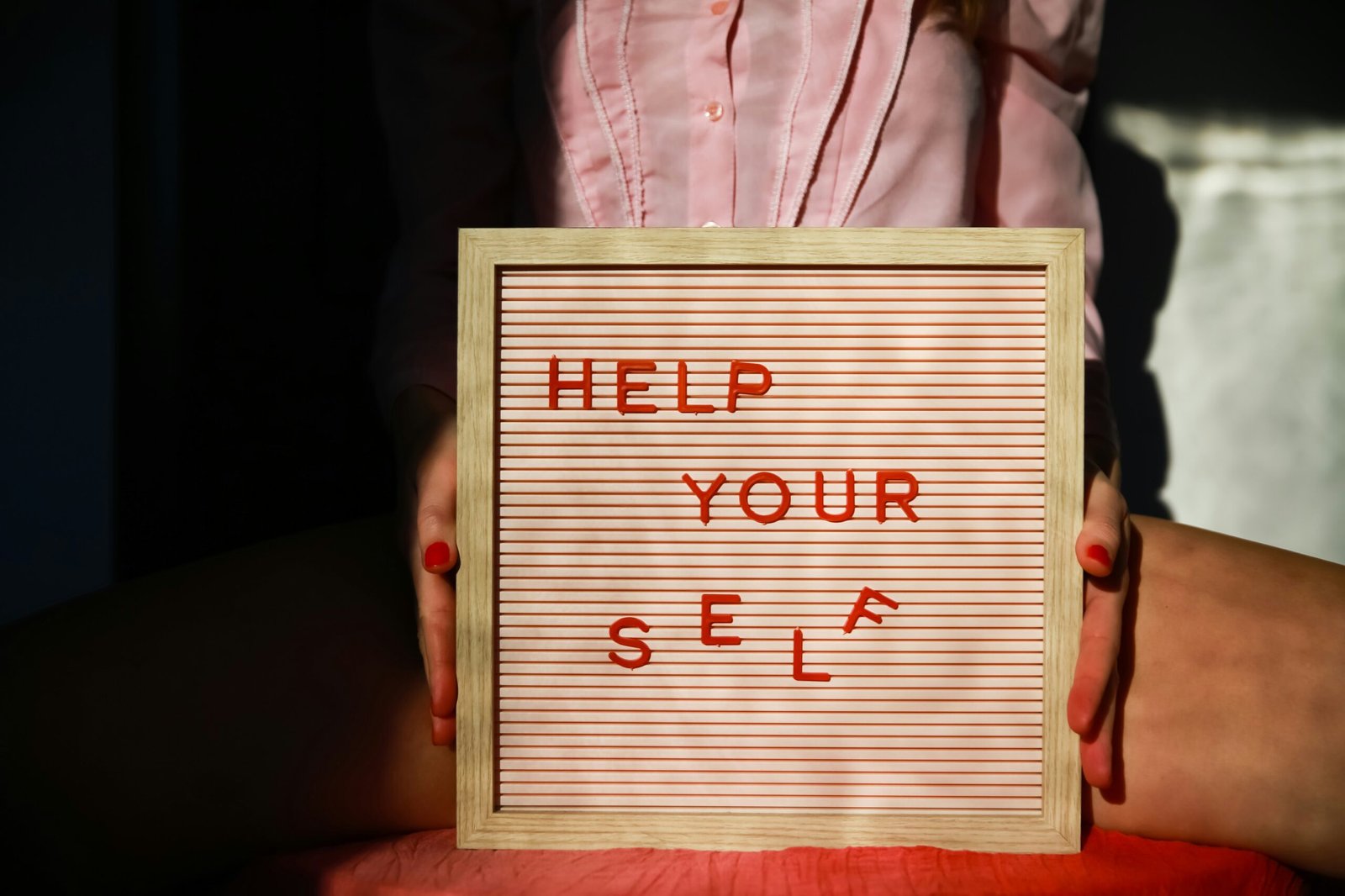Globally, mental health issues are prevalent, with the World Health Organization (WHO) estimating that more than 264 million people suffer from depression, while anxiety disorders affect approximately 284 million individuals. These figures highlight the widespread nature of mental health challenges.
Mental health conditions do not discriminate, impacting people regardless of age, gender, or socioeconomic status. Therefore, understanding the importance of mental health is paramount in tackling these issues and enhancing individual well-being.
Mental health is all about how you think, feel, and handle life’s ups and downs. Sometimes, it might feel like taking care of your mental health is tough, but the good news is, there are simple habits you can build into your daily life that make a big difference. These habits can help you feel happier, calmer, and more in control of your emotions. Ready to dive in?
Here are ten healthy habits that can give your mental health a major boost.
1. Get Enough Sleep

Sleep isn’t just for resting your body; it’s also crucial for your brain. When you sleep, your brain recharges and processes everything you’ve experienced during the day. If you’re not getting enough sleep, you might feel grumpy, anxious, or unable to focus.
Aim for 7-9 hours of sleep each night. Try to go to bed and wake up at the same time every day—even on weekends! Create a bedtime routine, like reading a book or listening to calming music, to help your body know it’s time to wind down. Avoid screens before bed because the blue light can mess with your sleep. A well-rested brain is a happy brain!
Sleep also impacts your memory, creativity, and problem-solving skills. Without enough sleep, you might struggle with making decisions or staying productive. Over time, chronic sleep deprivation can increase your risk of mental health challenges, so make sleep a priority every day. Remember, getting enough rest isn’t lazy—it’s essential for your well-being.
Read Also: 35 Positive Self-Development Ideas Everyone Should Try
2. Eat Nutritious Foods
Have you ever heard the phrase “you are what you eat”? What you put into your body can impact how you feel mentally and emotionally. Foods like fruits, vegetables, whole grains, and lean proteins give your brain the nutrients it needs to work its best.
Avoid too much junk food, sugar, and caffeine. While a bag of chips or a soda might feel like a quick pick-me-up, it can lead to crashes that leave you feeling sluggish or irritable. Instead, snack on nuts, yogurt, or fresh fruit. Your brain will thank you!
Eating well isn’t just about avoiding junk food; it’s about fueling your body with the right balance of nutrients. Omega-3 fatty acids, found in fish, flaxseeds, and walnuts, are particularly good for brain health. Staying hydrated is also crucial—your brain is about 75% water, and dehydration can affect your mood and focus. Make mealtime an opportunity to nourish your body and mind.
Related: How to Trust Your Gut Even When You’re Anxious – 8 ways
3. Move Your Body
Exercise isn’t just about staying fit; it’s also fantastic for your mental health. When you move your body, your brain releases feel-good chemicals called endorphins. These chemicals can help reduce stress, boost your mood, and even improve your sleep.
You don’t need to run a marathon to enjoy the benefits of exercise. Find something you love, like dancing, swimming, playing a sport, or even taking a walk around your neighborhood. Aim for at least 30 minutes of activity most days of the week. Exercise makes you feel good—inside and out!
Regular physical activity can also improve your self-esteem and resilience. It helps your brain grow new connections, which can improve memory and learning. If you’re feeling down or stuck, a quick workout can be just the thing to help you feel better and think more clearly. Make movement a habit, and you’ll notice the difference.
Related: 8 Easy Practices I Use to Boost My Confidence Daily
4. Practice Gratitude
Gratitude means focusing on the good things in your life. When you take a moment to appreciate what you have, it can help shift your mindset and make you feel more positive.
Each day, try writing down three things you’re thankful for. They don’t have to be big things. It could be as simple as enjoying a delicious breakfast, spending time with a friend, or seeing a beautiful sunset. By focusing on the positives, you’ll start to notice more of them in your life.
Gratitude doesn’t just make you feel good in the moment; it can also improve your relationships and overall outlook on life. Sharing your gratitude with others, like thanking a friend or complimenting someone, can strengthen your connections and spread positivity. Keep a gratitude journal, and watch how it transforms your perspective over time.
5. Connect with Others
Humans are social creatures. Having strong connections with friends, family, or even a pet can do wonders for your mental health. Talking to someone you trust about how you’re feeling can lighten your emotional load.
Make time for the people who make you feel happy and supported. Whether it’s having a movie night with your family, texting a friend, or joining a club, these connections remind you that you’re not alone. Feeling connected to others helps you feel stronger and more secure.
Building meaningful relationships takes effort, but it’s worth it. If you’re feeling isolated, consider volunteering or joining a community group. Acts of kindness and being part of a supportive network can boost your mental health and give you a sense of belonging. Remember, quality matters more than quantity when it comes to relationships.
6. Take Breaks
Life can be super busy, and it’s easy to feel overwhelmed. That’s why taking breaks is so important. Breaks give your mind a chance to rest and recharge.
When you’re studying, working, or even just scrolling through social media, try the 20-20-20 rule: every 20 minutes, look at something 20 feet away for 20 seconds. Also, don’t be afraid to take longer breaks when you need them. Go for a walk, stretch, or just sit quietly. Giving yourself permission to pause can make a huge difference.
Taking breaks can also boost your creativity and problem-solving abilities. When you step away from a task, your brain has time to process and come up with new ideas. Schedule regular breaks throughout your day, and don’t forget to unplug from technology during some of them. Your brain will thank you for the downtime.
7. Practice Mindfulness
Mindfulness is all about being present in the moment. It’s like hitting the pause button on your busy thoughts and focusing on what’s happening right now. Mindfulness can help reduce stress and anxiety while boosting your overall happiness.
You can practice mindfulness through meditation, deep breathing, or simply paying attention to your surroundings. Try this: close your eyes, take a deep breath in, and slowly exhale. Notice how your body feels as you breathe. Even just a few minutes a day can make a big impact.
Mindfulness also helps you respond to challenges more calmly. Instead of reacting impulsively, you can approach situations with clarity and patience. Explore mindfulness apps, guided meditations, or simple practices like savoring your meals. The more you practice, the more natural it becomes.
8. Set Realistic Goals
Setting goals gives you something to work toward and can help you feel accomplished. But here’s the trick: your goals should be realistic and achievable. If you set goals that are too big, you might feel stressed or discouraged.
Break your goals into smaller steps. For example, instead of saying, “I’ll get straight A’s this semester,” try, “I’ll spend 30 minutes each day studying math.” Celebrate your progress along the way. Every small win is a step toward something bigger!
When you achieve your goals, reward yourself. Recognizing your hard work boosts your confidence and motivates you to keep going. Be kind to yourself if you face setbacks, and remember that progress is more important than perfection. Your goals are a roadmap to your dreams—follow them with patience and determination.
9. Limit Screen Time

Spending too much time on your phone, computer, or watching TV can affect your mental health. It’s easy to compare yourself to others on social media or feel overwhelmed by all the information out there.
Set boundaries for your screen time. Try putting your phone away during meals or before bed. Use that time to read, go for a walk, or chat with a friend instead. A little less screen time can lead to a lot more peace of mind.
Screen-free activities can help you feel more connected to the world around you. Try hobbies like painting, gardening, or journaling to unwind and express yourself. Remember, it’s okay to unplug and take a break from the digital world. Your mental health will thank you.
10. Ask for Help When You Need It
There’s no shame in asking for help. In fact, it’s one of the bravest things you can do. If you’re feeling overwhelmed, sad, or anxious, reach out to someone you trust. This could be a parent, teacher, counselor, or friend.
Sometimes, talking things out is enough. Other times, you might need extra support from a professional. That’s okay! Therapists and counselors are trained to help you navigate tough emotions and challenges. Remember, you’re not alone, and there’s always someone who wants to help.
Asking for help shows strength, not weakness. It means you care about yourself and your well-being. Keep a list of people or resources you can turn to when things get tough. Whether it’s a hotline, support group, or trusted friend, help is always within reach.
Final Thoughts
Taking care of your mental health is a journey, and it’s okay to take it one step at a time. By building these ten habits into your daily life, you’re setting yourself up for a happier and healthier future. Remember, it’s not about being perfect; it’s about making small changes that add up over time.
So, which habit will you try first? Whatever you choose, know that you’re taking an important step toward feeling your best. You’ve got this! Life is full of opportunities to grow, heal, and thrive. Embrace the journey, and take care of yourself every step of the way.
Save the pin for later



